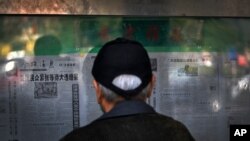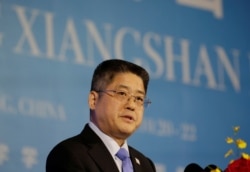This week a top Chinese diplomat expressed hopes that whoever wins the U.S. presidential election, the two countries will work to reduce tensions over trade and other issues.
In a carefully worded statement, Chinese Vice Foreign Minister Le Yucheng on Thursday said he expects whoever wins the election to meet China halfway and avoid the path of conflict and confrontation. He did not say which of the two presidential candidates he expects to win but made it clear Chinese officials are looking for ways to improve relations.
"We hope that the next U.S. government will meet China halfway; uphold the principles of non-conflict, non-confrontation, mutual respect and win-win cooperation; focus on collaboration; manage differences; and push forward bilateral ties along the right track," Le said while replying to a question posed at a news conference.
Relations between Beijing and Washington this year plummeted over the coronavirus pandemic, but before then Trump’s China policy changed through his presidency.
Trump hosted Chinese President Xi Jinping for a meeting in the first months of his administration. However, relations worsened during a trade war and as the coronavirus health crisis grew in 2020, Trump strongly criticized China over in allowing the outbreak to become a global pandemic.
Biden has called for more attention on human rights issues in China and the situation in Hong Kong. He also has supported keeping pressure on China for its trade methods.
American experts think there is little reason for China to celebrate whoever wins the presidency because the damage done by Chinese trade and investment policy is felt across the political spectrum in the U.S.
“If China expects an incoming Biden administration to simply “forgive and forget” China’s misbehavior on trade, tech, Hong Kong, Xinjiang, and other issues, they’re likely in for a rude awakening,” Scott Kennedy, Senior Adviser and Trustee Chair in Chinese Business & Economics, Center for Strategic & International Studies (CSIS) told VOA.
Some experts think the trade war will continue even if a Biden administration takes charge but the two sides would demonstrate some spirit of accommodation in some areas. At the same time, there will be more efforts to reduce U.S. trade dependency on China.
“It is likely that the trade war will continue although it may be somewhat adjusted and the Biden administration will be more pragmatic. It will push for more exports of American goods to China. But it will be less vehement on China when it comes to public rhetoric,” said Rana Mitter, a China expert and professor at the University of Oxford.
The Chinese Vice Foreign Minister Le Yucheng said Thursday that it serves both China and the U.S. to maintain and promote healthy and steady growth of bilateral relations to meet the common aspiration of the international community, he said.
"China's attitude toward the bilateral relations is clear and consistent," said Le. "Although there are differences between the two countries, they also have extensive common interests and room for cooperation,” the Vice Foreign Minister said.
The days-long vote counting in the American presidential election has generated intense interest on China’s government-controlled social media.
Topics relating to the U.S. election have been trending on China's most popular social media platform Sina Weibo for days, with "#US Presidential election" registering about several billion reads.
There are no free elections in China, where the Chinese Communist Party choses leaders through a closed, internal process. Through state-controlled media, the party frequently highlights negative news in western democracies.
The state-controlled Global Times this week published an opinion piece titled, “Chinese people showing interest in U.S. presidential election for laughs, comicalness” and cited examples of posts from social media users ridiculing the court battles and protests in some places during vote counting.
VOA’s own digital traffic indicates a surge of interest in news about the election from people in mainland China.





